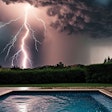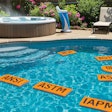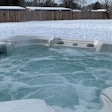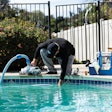
Noel Conley runs Miracle Pool Service in an unincorporated area outside Dallas near the city of Garland, Texas. His clientele consists almost entirely of residential homeowners, many of them with gunite pools in new housing editions in the old/modern style with the homes tightly packed in. Amid the demands of a service business, Mr. Conley finds time to fulfill his duties as vice chairman of the APSP Service Council.
How’s the service business climate in suburban Dallas?
The economy in Texas was not hit as bad in the recession as the rest of the nation. The companies that were doing service work, at least in this area, did not see much of a downturn. The builders were the ones who got hurt because people couldn’t get financing. They really took it on the chin.
Some service companies report a release of pent-up demand for replacement work. Are you seeing any of that?
You’re going to pick up some of that as the economy gets better. But in our area, we didn’t have people putting things off that they had to have. I think the average service company here in Texas will pick up some business this year, but just not as much as some other areas of the country because we didn’t drop off as much in the downturn.
New legislation has become a perennial issue in this industry. Anything coming out of Texas?
Luckily, in Texas, our legislature only meets once every two years. They are meeting this year, and any time they are in session, you have the worry that they are going to pass something that will be an undue burden on the industry.
But the big problem in this part of Texas is the drought. We are worried that the North Texas Municipal Water District will enact Stage 4 Water Restrictions. Stage 4 means that permits will not be issued to build swimming pools. That is our main concern right now.
If we don’t get significant rain, I think there’s a very good chance that will happen.
It’s different in different parts of Texas. Houston is a different story. So is Austin. But here, we have a big lake where when you drive over the bridge, on one side there’s water, and on the other side, there’s grass growing. Lake levels are very low, and these are the lakes where we get our drinking water.
Are you seeing any impact from the drought on your business?
Not so far. One thing we’re seeing is more business for the leak detection companies. The ground gets dry, shrinks up, and underground pipes give way and break.
Has the drought led to sales of water conservation products in your area?
Around here, anybody who is going green is thinking about electrical. So they’re putting on variable speed pumps and things like that. Right now, they’re not putting a cover on the pool because they’re worried about water savings. But I think that may change. People will start to want covers if they start raising the price of water, but water right now, even with the drought, is still relatively cheap.
Is healthcare an issue for your company?
Healthcare…yes that is the big question. We do currently provide healthcare, but we are analyzing that right now. There is a good chance that we will not be able to continue to do provide healthcare. The cost keeps going up, and we’re paying more and more for less coverage.
Will your employees go on the ACA exchanges?
Depending on how much money you make or how many dependents you have, you may be able to go on the ACA network and apply for healthcare. Some people can get money or credit and some people can’t. It’s confusing.
The problem for us is that some of our employees might be able to go out there on the ACA network and get coverage cheaper than they’re getting at our company. But because we’re offering coverage, they’re not eligible to do that. So for some employees, if their company drops healthcare coverage, it’s an advantage.
The No. 1 business concern in our survey was finding and keeping good workers. Is that a concern for you?
Luckily, we’ve been able to keep the employees we have right now for a few years. But yes, that is a big concern. If you lose somebody for whatever reason, that’s a major problem — finding somebody that really wants to work. It’s harder than you would think. Fewer people today than 20 years ago have a good work ethic.
What surprised you most last year in terms of product sales?
I would say that the biggest surprise last year was that we got a lot fewer calls for salt systems than we had in years past. We still got a lot of calls, but there were far fewer people enquiring about it, far fewer regular customers saying, “I have a friend with a salt system and he thinks it’s great. Should I change over?”
It was probably down 50 percent.
Why do you think that’s happening?
I think more information is getting out about salt systems. People now realize it’s not a situation where you get a salt chlorine generator and it becomes a maintenance-free pool. Because that’s what a lot of people think.
And there’s also enough stuff on the Internet where some people are complaining about the possible deterioration of their coping and decks because of salt.
Yes. I still meet people that talk about their chlorine-free salt pools.
That’s my first question when somebody asks about a salt chlorine generator: Why do you want this system?
And when they say, “I don’t want chlorine in my pool,” I have to tell them that’s not how a salt system works.
What products seem poised for success?
Well, the variable speed pumps, when they first came out, some manufacturers had some problems, but they’ve worked through a lot of that. And now I think variable speed is the way everyone is going to go.
They’re not offering any rebates right now in Texas, which is a little surprising, but I can see that changing.
What about online retail competition?
The big issue is when pool owners buy online and want you to do the installation. Or they buy online, install it incorrectly, it doesn’t work right, and now they’re calling a warranty station, saying they want warranty work done on the product they installed wrong.
Our policy is: You buy it over the Internet, we’re not installing it for you. Same thing for warranty work. Sorry, we’re not going to go out on a warranty call for a product you bought on the Internet and installed yourself.
Does your company have a retail store?
I used to work in retail. I won’t do that again. That’s just me. I worked in retail for a while in Maryland, and I’ll never forget a customer who bought a pool cover from us, used it all winter, and then brought it back in the spring for her money back.
She said, “We decided we didn’t need it.”
What’s the biggest challenge for your company?
I think a service company’s biggest challenge now is keeping up with new products and new technology. It used to be, if you could fix Raypak’s heater, you could fix anyone’s. They were basically all the same.
Now every year, manufacturers have a new version of their controls, a new version of their heater or pump, and you have to stay up to date on all of that in order to be able to do your job. And it gets tougher every year.
Equipment is more complex now — and you’re hooking it up to the Internet. Twenty years ago, if you would have said you wanted that kind of control, we would have thought you were crazy. Who would even want that kind of function?
When I started here in Texas, we had two different models of time clocks, and when you talked about automation and controls, that’s what you were talking about — two mechanical time clocks.
What do you see on the horizon for service?
Over the next several years, the hot topic is going to be licensing. If it’s done right, I’m in favor of licensing.
And also enforcement, that is a big issue. Here in Texas, to replace equipment, each individual doing the work has to have a residential appliance installer’s license, and the company has to have a contractor’s license. Of the approximately 8,000 to 10,000 swimming pool companies here in Texas, there are only about 550 contractor licenses issued.
Comments or thoughts on this article? Please e-mail [email protected].
That tells you something.












































